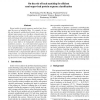Free Online Productivity Tools
i2Speak
i2Symbol
i2OCR
iTex2Img
iWeb2Print
iWeb2Shot
i2Type
iPdf2Split
iPdf2Merge
i2Bopomofo
i2Arabic
i2Style
i2Image
i2PDF
iLatex2Rtf
Sci2ools
106
click to vote
BIBM
2008
IEEE
2008
IEEE
On the Role of Local Matching for Efficient Semi-supervised Protein Sequence Classification
Recent studies in protein sequence analysis have leveraged the power of unlabeled data. For example, the profile and mismatch neighborhood kernels have shown significant improvements over classifiers estimated under the fully supervised setting. In this study, we present a principled and biologically motivated framework that more effectively exploits the unlabeled data by only utilizing regions that are more likely to be biologically relevant for better prediction accuracy. As overly-represented sequences in large uncurated databases may bias kernel estimations that rely on unlabeled data, we also propose a method to remove this bias and improve performance of resulting classifiers. Combined with a computationally efficient sparse family of string kernels, our proposed framework achieves state-ofthe-art accuracy in semi-supervised protein remote homology detection on three large unlabeled databases.
BIBM 2008 | Bioinformatics | Large Unlabeled Databases | Mismatch Neighborhood Kernels | Unlabeled Data |
| Added | 12 Oct 2010 |
| Updated | 12 Oct 2010 |
| Type | Conference |
| Year | 2008 |
| Where | BIBM |
| Authors | Pavel P. Kuksa, Pai-Hsi Huang, Vladimir Pavlovic |
Comments (0)

